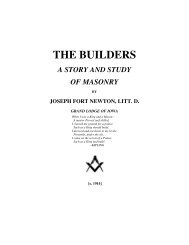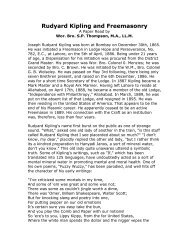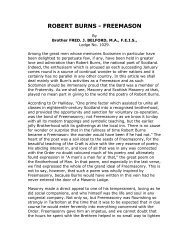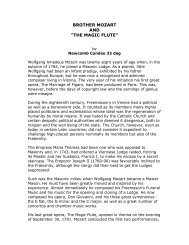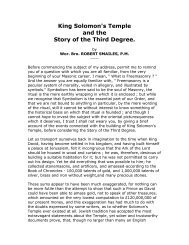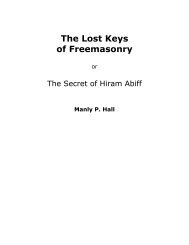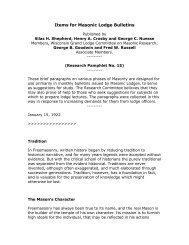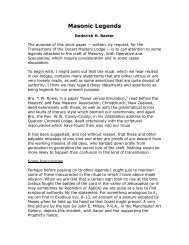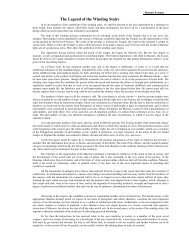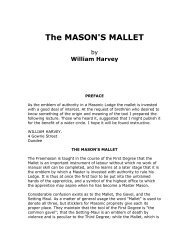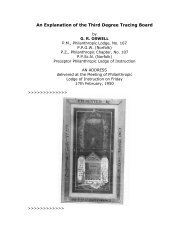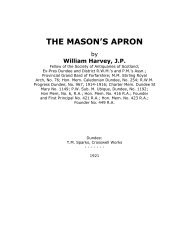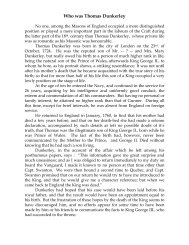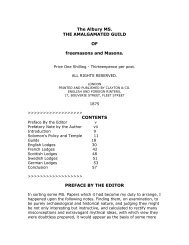Through the Key Hole - RoseCroix.org.au
Through the Key Hole - RoseCroix.org.au
Through the Key Hole - RoseCroix.org.au
Create successful ePaper yourself
Turn your PDF publications into a flip-book with our unique Google optimized e-Paper software.
46<br />
The ancient Phoenician alphabet and on <strong>the</strong> coins of <strong>the</strong> Maccabees,<br />
has <strong>the</strong> shape of a cross.<br />
Among <strong>the</strong> Druids it was <strong>the</strong> custom to consecrate a tree by cutting<br />
<strong>the</strong> form of a T<strong>au</strong> Cross on its bark. In ancient times it was set<br />
as a mark on those who had been acquitted by <strong>the</strong>ir judges and<br />
by military commanders on such of <strong>the</strong>ir soldiers who had escaped<br />
unhurt from battle, and hence it was considered to be an<br />
emblem of life.<br />
Finally, we observe that <strong>the</strong> T<strong>au</strong> is <strong>the</strong> last letter of <strong>the</strong> Hebrew<br />
alphabet as <strong>the</strong> Aleph is <strong>the</strong> first, and that <strong>the</strong> T<strong>au</strong> assumes in <strong>the</strong><br />
ancient Phoenician and Samaritan alphabets <strong>the</strong> form of <strong>the</strong><br />
cross; and we see ano<strong>the</strong>r consecration of this symbol in <strong>the</strong> expression<br />
“ I am <strong>the</strong> Alpha and <strong>the</strong> Omega, <strong>the</strong> beginning and <strong>the</strong><br />
End”, which spoken in <strong>the</strong> Hebrew language would be , “ I am <strong>the</strong><br />
Aleph and <strong>the</strong> T<strong>au</strong>”.<br />
It is not surprising that <strong>the</strong> T<strong>au</strong> Cross has been adopted as one of<br />
<strong>the</strong> symbols of Freemasonry and that in <strong>the</strong> form of <strong>the</strong> Triple T<strong>au</strong><br />
it constitutes <strong>the</strong> most sacred emblem of <strong>the</strong> Royal Arch, symbolising<br />
<strong>the</strong> fact that <strong>the</strong> possessors of that degree are consecrated<br />
and separated, or set apart as <strong>the</strong> recipients of a sublime but hidden<br />
wisdom.<br />
130<br />
Amongst o<strong>the</strong>r things he suggests that Masonry’s peculiar words<br />
actually find <strong>the</strong>ir origin in <strong>the</strong> Normandic French, <strong>the</strong> language of <strong>the</strong><br />
Templars, and consequently if <strong>the</strong> origin of speculative Freemasonry<br />
does in fact find its source in <strong>the</strong> Templars, <strong>the</strong>n it might possibly be<br />
no surprise that <strong>the</strong> Knights introduced <strong>the</strong>se special words to <strong>the</strong><br />
Craft.<br />
Although I will be more specific on Bro. Robinson’s conclusions<br />
shortly, I believe that I should firstly comment on <strong>the</strong> subject of <strong>the</strong><br />
Knights Templar. It is common knowledge that when <strong>the</strong> Templars<br />
were persecuted by King Phillip Le Bel of France, many of <strong>the</strong>m escaped<br />
by fleeing to Scotland and if <strong>the</strong>y did indeed infiltrate Freemasonry<br />
and introduced some of <strong>the</strong>ir ideas such as, for example,<br />
when <strong>the</strong>y held a meeting, a knight with a drawn sword was stationed<br />
outside <strong>the</strong> door of <strong>the</strong> meeting place<br />
to keep out all intruders, surely by <strong>the</strong> time my Old Scots Language<br />
book published in 1858, <strong>the</strong> special words <strong>the</strong>y used ( e.g.<br />
Lewis) would have been equally as common knowledge as <strong>the</strong> word<br />
“cowan”? Why <strong>the</strong>n do <strong>the</strong>se words not appear in my lexicon?<br />
Bro. Robinson suggests <strong>the</strong> following. I have omitted may of <strong>the</strong><br />
words that ei<strong>the</strong>r I believe he is truly stretching to prove his <strong>the</strong>ory or<br />
where such words are inappropriate at this time, as referring to<br />
higher degrees.<br />
TYLER: The English word tailor derives from <strong>the</strong> French word<br />
“tailleur” meaning to cut. This derivation is reasonably logical and is<br />
only one of <strong>the</strong> many French words that have become a part of <strong>the</strong><br />
everyday English language. Why not <strong>the</strong>n <strong>the</strong> word “tyler” as a derivation<br />
of <strong>the</strong> same French word ‘tailleur’ meaning to cut? It doesn’t<br />
take much imagination to go from tailleur to tyler just as it takes<br />
hardly any imagination to go from <strong>the</strong> word tailleur to tailor.<br />
COWAN:<br />
In <strong>the</strong> Normandic French is a word “couenne” ( pronounced<br />
koo-wahn) which means an ignorm<strong>au</strong>s or bumpkin ( ?? Unskilled<br />
labourer = <strong>the</strong> Scots meaning of <strong>the</strong> word being an inexperienced<br />
apprentice)<br />
DUE GUARD:<br />
There is a French term meaning a protective gesture<br />
“ geste du garde” which in common parlance became to shortened<br />
to “du gard”.



